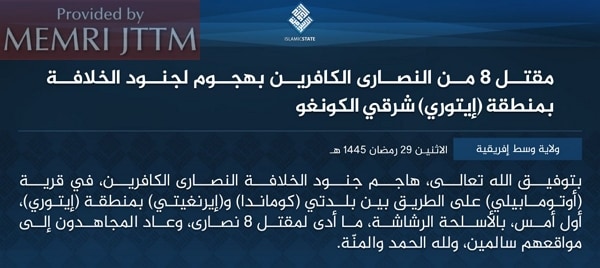The following report is now a complimentary offering from MEMRI's Jihad and Terrorism Threat Monitor (JTTM). For JTTM subscription information, click here.
In the final week of the holy month of Ramadan, Islamic State (ISIS) affiliates in Africa have continued their attacks on Christian civilians in the Democratic Republic of the Congo (DRC) and Nigeria. Since the beginning of April, the Islamic State Central Africa Province (ISCAP) and Islamic State West Africa Province (ISWAP) have claimed killing 21 Christians, some of them by beheading, and burning a church, a Christian school, and several homes.
ISCAP Claims Killing 19 Christians, Most Of Them Beheaded
On April 2, ISCAP operatives assaulted the village of "Otto Mabele," likely referring to Ofaye Otto Maber in the DRC's Ituri province, capturing and beheading two Christian civilians.[1]
ISCAP operatives attacked the village again on April 5, capturing and beheading another four Christians.[2]
On April 6, ISCAP operatives assaulted "Bandimbisi" village in Ituri province, capturing and beheading five Christians.[3]

ISCAP operatives, armed with machine guns, attacked "unbelieving Christians" in Ofaye Otto Maber again on April 6, killing eight, before returning safely to their positions.[4]

ISWAP Claims Killing Two Christians, Burning A Church, School, And Homes
On April 4, ISWAP operatives assaulted "unbelieving Christians" with machine guns in Mandaragirau village in Nigeria's Borno state, causing the villagers to flee. They subsequently set fire to a Christian school.[5]

On the same day, ISWAP operatives armed with machine guns attacked Christians in "Haram" (perhaps Haran) village in Borno state, causing them to flee and setting fire to the house of the "village's leader."[6]

ISWAP operatives launched an attack the same day with machine guns, targeting Christians in the village of Takulashi, Borno state, killing two villagers, and burning five homes.[7
On April 7, ISWAP operatives again fired machine guns at Christians in Haran village, causing them to flee, then set fire to a church and some Christian homes.[8]

On April 4, ISCAP published photos documenting an attack on Mangodomu village, in the DRC's North-Kivu province, where its operatives burnt Christian homes to the ground, pulled down crosses, and captured and killed Christian villagers.[9]
ISIS affiliates in the DRC, Nigeria, and Mozambique have claimed killing dozens of Christian villagers and torching dozens of homes in multiple attacks over recent months.[10]
In his March 28 speech, ISIS spokesman Abu Hudhayfah Al-Ansari praised the organization's branches in Africa for "killing, capturing, and displacing [Christians] in permanent waves of displacement," urging them to "keep up your effort and your jihad, and continue to target Christian gatherings and government centers."[11]
[1] Telegram, April 6, 2024.
[2] Telegram, April 6, 2024.
[3] Telegram, April 6, 2024.
[4] Telegram, April 8, 2024.
[5] Telegram, April 7, 2024.
[6] Telegram, April 7, 2024.
[7] Telegram, April 8, 2024.
[8] Telegram, April 8, 2024.
[9] See MEMRI JTTM Report: WARNING – GRAPHIC: Islamic State Central Africa Province Raids Christian Village In The Democratic Republic Of The Congo, Pulling Down Crosses, Razing Homes To The Ground, And Murdering Christian Civilians, April 4, 2024.
[10] For recent examples, see MEMRI JTTM Reports: Islamic State (ISIS) Affiliates In DRC, Mozambique Continue Attacks On Christian Villages, Killing More Than 15, Burning More Than 20 Homes, Churches, Schools, March 7, 2024; and Islamic State (ISIS) Affiliates In Democratic Republic Of Congo, Mozambique, And Nigeria Launch Attacks On Christian Villages, Killing About 30, Taking Hostages, Burning Homes, March 18, 2024.
[11] See MEMRI JTTM Report: In Audio Address Marking Ten Year ISIS Anniversary, Spokesman Calls For Lone Wolf Attacks In U.S., Europe, Israel: 'Target The Crusaders And The Jews Everywhere; Move The Battle To Their Backyards'; Claims War On ISIS Ended In Syria Only To Expand Elsewhere, Praises Moscow Attack As 'Act Of Vengeance,' Lauds Fighters For Killing Africa's Christians, March 29, 2024.
The full text of this post is available to subscribers.
Please login or register to request subscription information from MEMRI









